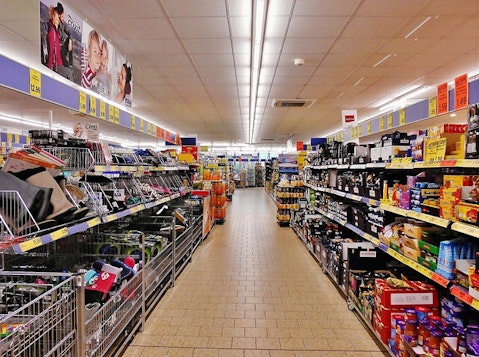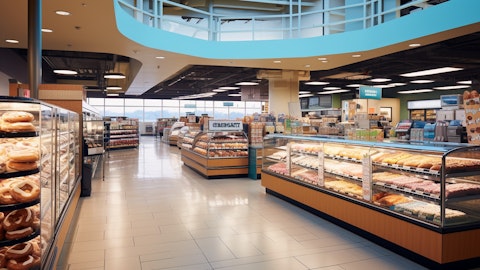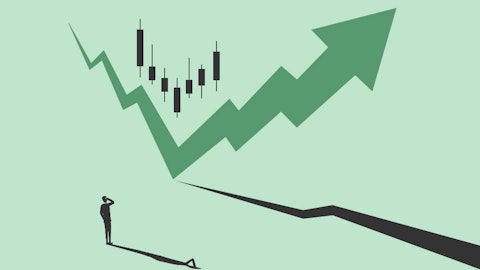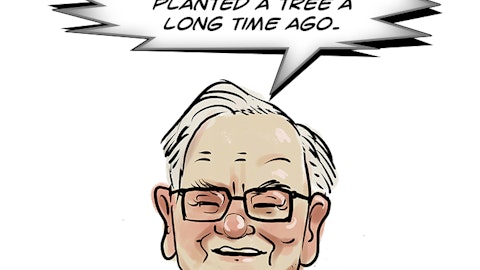Kroger Co (NYSE:KR) is one of the biggest retailers in the US that has become a household name across the country, thanks to its ever-growing private label collection, cheap prices and accessibility. There are over 2700 Kroger stores in the US. Kroger is in the process of clearing hurdles to complete its $25 billion acquisition of Albertsons.
Warren Buffett first added Kroger Co (NYSE:KR) to his portfolio in the fourth quarter of 2019. As of the end of the first quarter of 2024, Berkshire Hathaway owns a $2.9 billion stake in the Ohio-based company which has seen its share price gain about 8% over the past one year and 128% over the past five years.
Kroger’s Dividend Metrics: Important Highlights
Kroger Co (NYSE:KR) has increased its dividend consistently over the past 18 years. Kroger’s dividend yield stands at about 2.14% as of May 20, close to the grocery store industry average of 2.33%. Kroger’s payout ratio as of May 20 stands at just 37%, which is very low, which means the company is funneling cash to grow its business that will further support future dividends. Over the past ten years, Kroger Co (NYSE:KR)’s dividend has increased at a CAGR of over 13.5%, crushing past sector media growth of just 5.4%.
The Bull Case for Kroger Co (NYSE:KR)
Kroger Co (NYSE:KR)’s long-term potential appears to be strong amid a loyal customer base and earnings growth, driven by American consumers’ preference for cheaper grocery items as inflation continues to bite. Strong digital growth and an increase in loyal customers caused Kroger’s sales to grow 6.4% to $37.1 billion in the fourth quarter of 2023, when inflation was hammering American households. Gross margins in the period also surged by 20 basis points on a year-over-year basis to 22.7%. Adjusted EPS in fiscal 2023 jumped to $4.76 from $4.23 in 2022, clocking in a 12.5% YoY growth. Kroger’s FCF almost doubled to $2.9 billion as of the end of 2023.

Expansion of Physical Stores to Trigger More Growth
Kroger Co (NYSE:KR) recently revealed that it plans to expand its brick-and-mortar store base in the near future. Analysts welcomed this development as sooner or later inflation pressures will slow down and Kroger having more stores in the country would give a boost to sales. With just over 2700 stores in the US (under different brand names), Kroger Co (NYSE:KR) is lagging behind competitors like Walmart (over 4700 locations). Kroger Co (NYSE:KR) management revealed in its Q4’2023 earnings call that customers who shop “both in-store and online spend 3x to 4x more compared to in-store only shoppers.” With digital investments already showing fruit, a rise in physical stores would strengthen the company’s position to profit from an environment where interest rates would decline and Americans would begin to shop with more ease.
Kroger’s Moat
Amid rising inflation, consumers prefer to buy cheaper options often known as “store brands.” This is where Kroger Co (NYSE:KR) as an advantage. Kroger Co (NYSE:KR) also enjoys greater control over prices thanks to its 35 food manufacturing facilities and 44 different distribution centers. The company plans to invest further in these facilities to increase margins. Kroger’s interim CFO Todd Foley commented during Q4’2023 earnings call:
“We expect capital investments for 2024 to be between $3.4 billion and $3.6 billion, which is consistent with 2023 in our long-range model. Capital investments will be aligned with our strategic priorities and expect to drive sales growth and improve margins. To drive sales, our focus is on enhancing the customer shopping experience and increasing store investments. As Rodney mentioned earlier, in 2024, we plan on completing 30 major storing projects, including new stores, relocations and expansions with a focus on investments in higher-growth geographies that have a track record of delivering strong ROIC.
To improve margins, 2024 investments will also enhance our supply chain, including expanding distribution center capacity and utilizing data and technology to optimize network efficiency. Productivity improvements and cost savings continue to be an essential element of our model and are key to helping us fund investments in associates and the customer experience.”
Valuation
Conservative estimates for Kroger Co (NYSE:KR)’s earnings growth expect the retailer’s earnings to grow at a CAGR of 4.59% in the next nine years. Analysts believe even at those assumptions, the stock is currently undervalued. According to Yahoo Finance data, Wall Street’s average analyst price estimate for Kroger is $58.07, which shows a 7% upside potential from the current levels.
Is Kroger Warren Buffett’s Best Dividend Stock Pick?
Despite this positive sentiment and catalysts, Insider Monkey’s research shows that Kroger is not in the list of Warren Buffett’s 8 Best Dividend Stock Picks.
Click to see the complete list of 8 Best Dividend Stock Picks of Warren Buffett.
If you are looking for an AI stock that is as promising as Microsoft but that trades at less than 5 times its earnings, check out our report about the cheapest AI stock.
READ NEXT: Michael Burry Is Selling These Stocks and A New Dawn Is Coming to US Stocks.
Disclosure: None. Is Kroger Co (NYSE:KR) Warren Buffett’s Best Dividend Stock to Buy Now? was originally published on Insidermonkey.com





